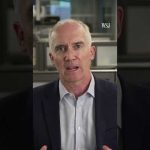In recent discussions surrounding the notion of Antifa, a peculiar debate has emerged, with some claiming the group’s existence is mere folklore, akin to tales of Bigfoot or the Loch Ness Monster. According to recent commentary from a conservative news channel, there appears to be a growing sentiment on the left that dismisses Antifa as an entirely imaginary organization. The narrative presented insists that not only does Antifa not exist as a formal group, but that it is merely a collection of loosely associated individuals with a penchant for radical ideas.
Listeners tuning in were treated to an enthusiastic denouncement of the so-called Antifa movement. The commentators argued that, unlike far-right extremists such as the Proud Boys or Oath Keepers—who they described as organized groups with defined leadership—Antifa is presented as a mythical construct. This led to an intriguing rabbit hole as the commentators questioned the legitimacy of any organized opposition to the group. To them, the very concept of Antifa has evolved into a modern-day myth, a face that many on the right argue does not have a true identity or organization behind it.
Further deliberation unveiled the idea that while Antifa may lack formal structure, it operates as an ideological movement. Pundits pointed out that many individuals express radical leftist sentiments online, particularly in spaces such as chat rooms or social media platforms. Yet, these individuals are not officially identifying as members of a centralized organization called Antifa, making it tricky to pin down the actual influence and activity of the so-called group. Rather, they are thought to be part of a broader network that shares similar goals, no matter the label they wear—or not wear in this case.
The conversation then shifted to a more contentious point – the role of academia. The commentators highlighted Mark Bray, a professor at Rutgers University, who they claimed endorses violent tactics against capitalism in his writings. They passionately argued that Rutgers should reconsider his employment, indicating that such views have no place in a university setting. As they criticized Bray’s ideas as cowardly nonsense, they simultaneously called for stronger accountability from institutions that might harbor such extremist viewpoints.
Bringing the discourse back to the real-world implications, the commentators expressed alarm over a recent survey suggesting that a significant portion of young individuals who identify as progressive consider violence an acceptable means of political expression. This revelation was shared with a mixture of disbelief and urgency, as the speakers implored that young generations are being misled and groomed into a culture of violence through various influences, from public education to online communities. The discussion concluded with a strong reminder about the importance of opportunity and positive engagement in American society, showcasing a stark contrast to the ideologies being critiqued.
In summary, the unfolding dialogue surrounding Antifa encapsulates a broader cultural battle between differing ideologies. With claims that Antifa exists only as a myth and that violent radicalization is a product of modern influences, the participants argued for a reevaluation of values and beliefs in society. They emphasized the need for open dialogue, personal accountability, and a return to opportunities that foster growth and prosperity rather than division and aggression. As the nation wrestles with these ideas, one thing remains clear: the fight for America’s identity continues to be a spirited, albeit contentious, battle.




